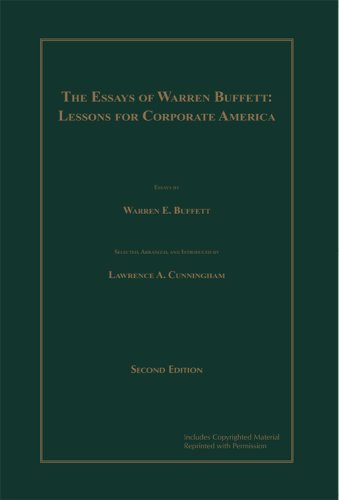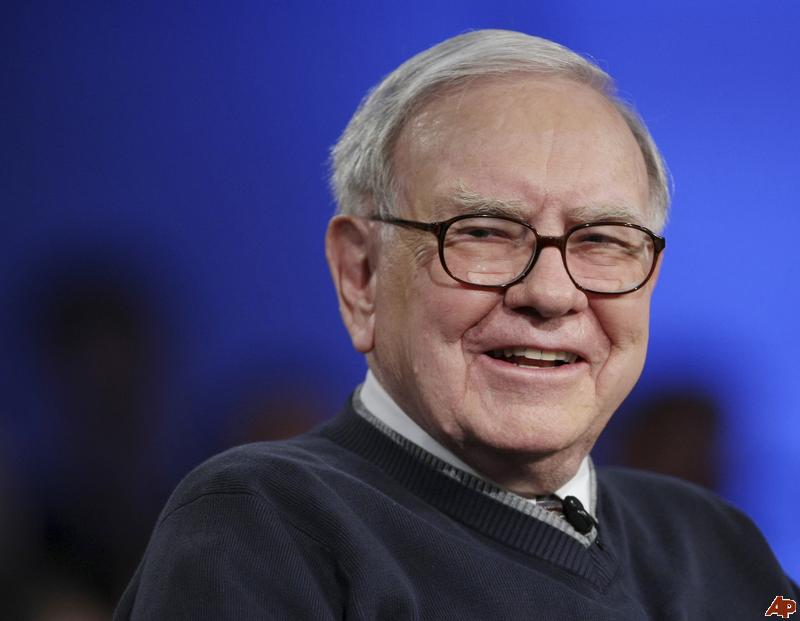The Essays of Warren Buffett: Review, Quotes & Lessons
Photo: Amazon
We would like to share with you one of our favorite books – The Essays of Warren Buffett. This book is a collection of wisdom pulled from Berkshire Hathaway’s annual letters from 1979 through 2006.
We would be understating the case to say that these letters have had a large impact on how we think about investing. While the Euclidean approach involves taking a view of what 50 years of company fundamentals can teach us about evaluating companies as potential investments, our findings have both validated and received context from many of the ideas found here.
As we know you are busy and may not have time to digest this book in its entirety, please consider finding time to review a few of our favorite sections, which we have highlighted below.
--
1) Mr. Market & Market Fluctuations
Buffett's discussion of Benjamin Graham’s Mr. Market, and the mental attitude toward market fluctuations that is most conducive to market success.
“So smile when you read a headline that says 'Investors lose as market falls.' Edit it in your mind to 'Disinvestors lose as market falls—but investors gain.' Though writers often forget this truism, there is a buyer for every seller and what hurts one necessarily helps the other."
{pages 77-81 | 1997 Chairman's Letter}
2) Growth vs Value
Buffett's perspectives that the industry’s distinction between ‘growth’ and ‘value’ investing is misguided, that growth is simply a component in the calculation of value, and that the term ‘value investing’ is redundant as what is investing if its is not the act of seeking value at least sufficient to justify the amount paid?
"In our opinion, the two approaches are joined at the hip: Growth is always a component in the calculation of value, constituting a variable whose importance can range from negligible to enormous and whose impact can be negative as well as positive."
{page 100 | 1992 Chairman's Letter}
3) Valuing a Business
Buffett's skepticism of the need to understand beta, efficient markets, modern portfolio theory and other concepts heralded by the investment community and, instead, his guidance to focus on simply how to a value business and think about market prices.
"Your goal as an investor should simply be to purchase, at a rational price, a part interest in an easily-understandable business whose earnings are virtually certain to be materially higher five, ten, and twenty years from now."
{page 108 | 1996 Chairman's Letter}
4) Predictions
Buffett's perspective that it is not worth trying to predict market fluctuations and, rather, to focus on being fearful when others are greedy and greedy only when others are fearful.
" 'I can calculate the movement of the stars, but not the madness of men.' .. - Sir Isaac Newton."
{pages 157-160 | 2005 Chairman's Letter}
5) Owner Earnings & Accounting Principles
While the pages here perhaps require a few attempts to fully digest, this section contains the most important insights in the entire book. It highlights the limitations of GAAP accounting in investment analysis. It also describes Buffett’s concept of Owner Earnings – that is, the amount of money a full owner of a business could expect to pocket from that business over time – as the relevant item to estimate when making investment decisions.
"Questioning GAAP figures may seem impious to some. After all, what are we paying the accountants for if it is not to deliver us the "truth" about our business. But the accountant's job is to record, not to evaluate... Managers and owners need to remember that accounting is but an aid to business thinking, never a substitute for it."
{pages 225-231 | 1986 Chairman's Letter}
6) Asset Valuation {Page 243}
His assessment of the oracle Aesop's famed adage, as the basis for explaining the formula for valuing all assets that are purchased for gain.
"His enduring, although somewhat incomplete, investment insight was 'A bird in the hand is worth two in the bush.' ... Aesop's investment axiom, thus expanded and turned into dollars, is immutable."
{page 243 | 2000 Chairman's Letter}
7) Forecasts & Behavioral Bias
Here Buffett extols the merits of ignoring political and economic forecasts and makes the comment, “we have usually made our best purchases when apprehension about some macro event were at a peak.”
"Fear is the foe of the faddest, but the friend of the fundamentalist. A different set of major shocks is sure to occur in the next 30 years. We will neither try to predict these nor to profit from them. "
{page 274 | 1994 Chairman's Letter}
We hope you enjoy this book.
Best Regards,
John & Mike
Additional resources on The Essays of Warren Buffett
What Investment - The one Warren Buffett book you need to read
The Motley Fool - Through the Years: Constant Themes in Buffett's Letters (video)
The Motley Fool - A Money-Making Lesson Buffett Wishes He Learned Sooner
Other Best of Buffett resources:
The SuperInvestors of Graham & Doddsville
Photo: WarrenBuffettStrategies.com



